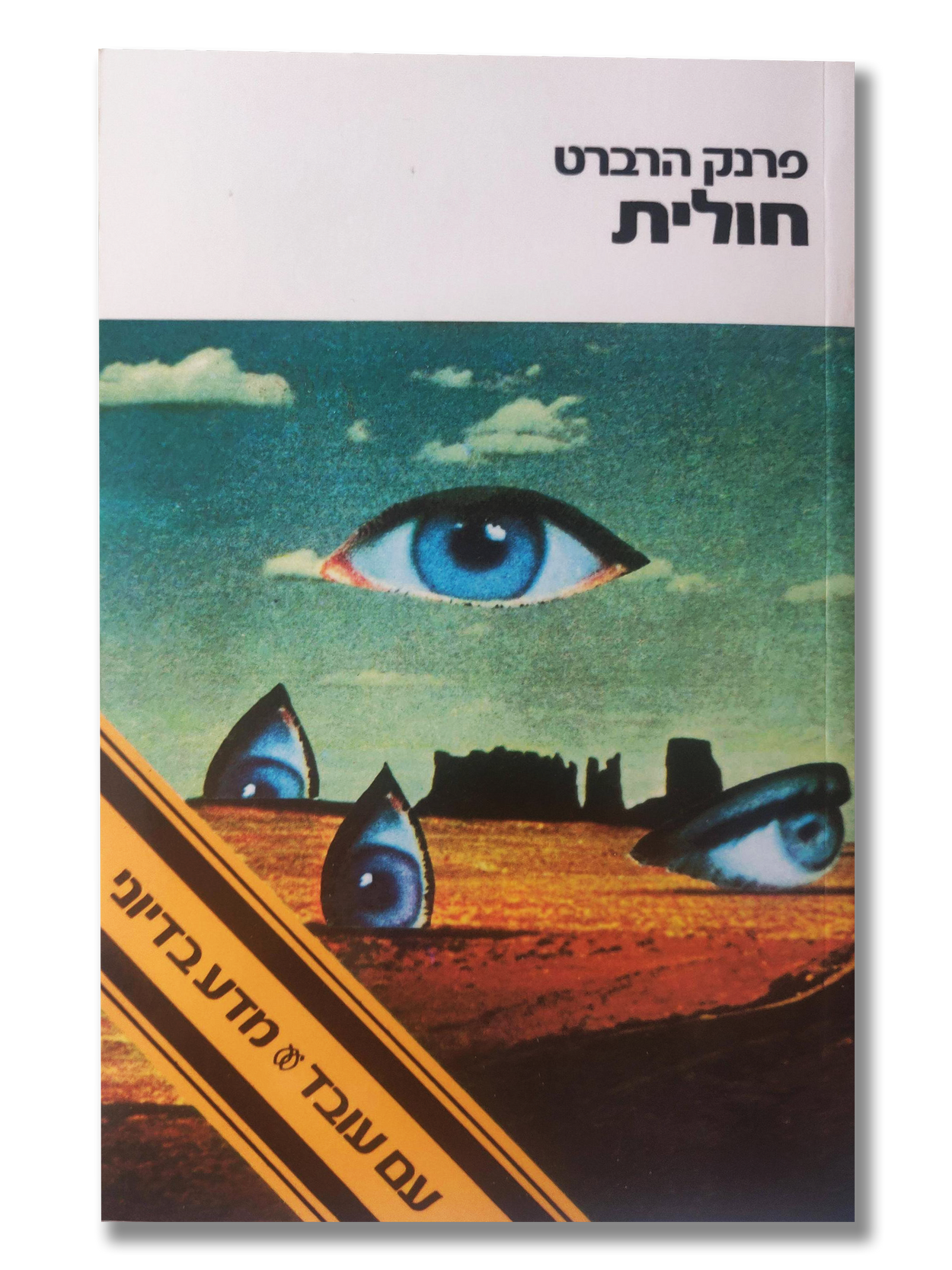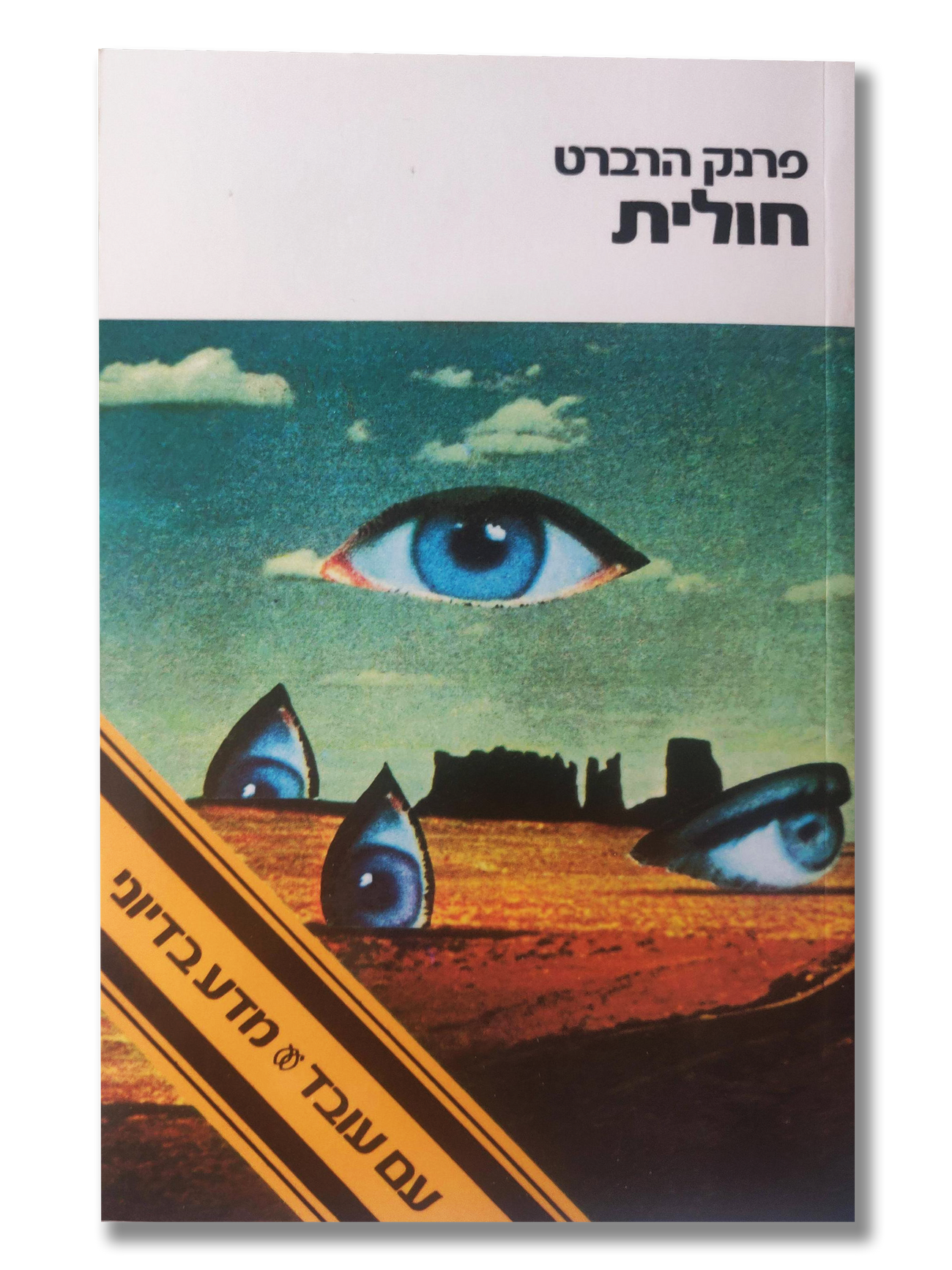Is Dune Better in Hebrew?
Israeli readers go crazy for the translation by prolific Emanuel Lottem, which showcases the vibrance of the book and the language itself




If you are a learned person in Israel, you have most likely come across a title translated by Emanuel Lottem. Born in 1944, Lottem began translating books for leading publishers in the 1980s while simultaneously working in the Israeli Ministry of Foreign Affairs. He began his career by translating nonfiction books into Hebrew, including dozens of titles by the world’s leading scholars, from popular science books by Richard Dawkins to historical research by Antony Beevor.
If you are an Israeli science fiction fan, however, you certainly will have read several titles translated by Lottem, who is also widely recognized as the country’s most prolific translator of genre literature. From classics like Larry Niven’s Ringworld and Ursula Le Guin’s The Left Hand of Darkness to modern bestsellers such as Ann Leckie’s Imperial Radch trilogy and Patrick Rothfuss’ The Name of the Wind, Lottem’s translations have shaped generations of Israeli genre fans—as did his tenure as the first chair of the Israeli Society for Science Fiction and Fantasy.
These fans would almost certainly agree that Lottem’s crowning achievement in translation of genre literature is the Hebrew edition of Frank Herbert’s masterpiece Dune. The novel tells the story of a feudal interplanetary society set in the distant future, following the lead character Paul Atreides as his family accepts stewardship of the planet Arrakis, the only source of “the spice,” a drug called melange that is necessary for space navigation and is therefore highly coveted and deeply significant. Atreides must navigate a series of complicated political, ecological, and religious challenges as his family struggles for control over Arrakis and its melange. Dune has been adapted into several film and television productions, including an upcoming blockbuster—premiering this Friday—directed by Dennis Villenueve and starring Timothée Chalamet.
Originally published in 1978, the Hebrew translation of Dune—now in its 22nd printing (far more than any other Hebrew translation of a modern science fiction book)—is widely hailed by Israeli fans for its rich use of the Hebrew language, which reflects the vibrant mosaic of linguistic, cultural, and scientific elements in Herbert’s original novel. Some Israeli fans even consider Lottem’s translation superior to the original—an assessment that Lottem feels uncomfortable with when I ask him. The richness of his translation, he explains, comes from a simple principle that has always guided him.
“My method has always been to use a Hebrew term when such a term exists as a parallel to a term from a foreign language.” As an example, he points to the term זחליל חולות (Zahlil Holot) which he used as a translation for the name of a mining vehicle in Dune, the Sandcrawler. While the translation is literal, the word Zahlil is uncommon in spoken Hebrew (it is used in Hebrew military terminology, in reference to tanks). “My guiding principle was to find Hebrew words that would make the text flow naturally. Herbert did not invent most of his terms; he borrowed them from different sources. I also did not need to invent many new terms for Dune.”
Lottem’s first encounter with modern science fiction literature happened during his army service. “I was always on the lookout for something to read, and there were dime novels, among them Amos Geffen’s Hebrew translation of Robert Heinlein’s book The Puppet Masters. I had read books by Verne, Wells, Orwell, and Huxley before, but no modern science fiction because there simply wasn’t any in Hebrew. The Puppet Masters was a true discovery for me.”
While working on his Ph.D. in London, where he had the chance to expand his reading list of science fiction literature beyond what was available in Hebrew translation, Lottem came across Dune and immediately realized that there was something remarkably different about it. “It won me over completely.”
Upon his return to Israel, Lottem started translating books as supplementary income for his job as an academic lecturer. “The Am-Oved publishing house gave me nonfiction books to translate. They just started publishing their own series of translated science fiction titles, so I asked ‘Why won’t you let me translate science fiction?’ and they said ‘What’s wrong with you? You’re an academic and science fiction is not for serious people!’”
The chance to translate science fiction literature came later, when Lottem started working in the Israeli Ministry of Foreign Affairs, in a research unit consisting of young academics. One day, he got a phone call from the editorial secretary of Am-Oved. “She said they heard that I wanted to translate science fiction, and asked if I have heard of a book called Dune.”
After making sure he got the job, Lottem was quick to share the news with colleagues, some of whom were also science fiction fans and volunteered to help. Notably, David Matnai, an expert in classic Arabic who went on to become one of Israel’s leading diplomats, helped Lottem with the different Arabic terms—a major help as it turned out, since Herbert’s own Arabic was not well developed. As Lottem recalls, Matnai remarked that “Herbert must have picked up most of his Arabic during a two-week vacation in Morocco.”
One example of this problem occurred early in the book, when Paul Atreides passes the deadly Gom Jabbar test, which causes horrific pain to assess a subject’s humanity, and the Reverend Mother who tests him calls “Kull Wahad!” in excitement. As Lottem explains, Hebrew readers, even if they don’t know Arabic, will immediately recognize the meaning of the term as simply “each one,” so he replaced it with the more proper Arabic enthusiastic exclamation, “Ajayeb.”
In other places, deeper meanings of terms in the book sent Lottem to search for parallels in biblical sources. This is how the name of planet Arrakis’ mighty sandworms was not simply translated as תולעי חול, or worms, but rather given the biblical name עקלתונים (Akalatonim) instead. “The English word ‘worm’ has deeper meanings—one of them is a reference to dragons,” Lottem explains. “The Hebrew word for worm, תולעת, (tola’at) has no such connotations. But the Hebrew language is not particularly rich with names for mythical beasts. One such name comes from the book of Isaiah: לויתן, נחש עקלתון (Leviathan, the coiling serpent). It seemed appropriate, since the word Akalaton has wormlike connotations in Hebrew.”
Another term with deep roots in Hebrew sources was used by Herbert himself in his novel: The title Kwisatz Haderach, referring to Atreides’ status as the bringer of the next step in human evolution, actually comes from Talmudic term קפיצת הדרך (Kfitzat Haderech), referring to a quick miraculous passage from one place to another. How did a Hebrew term find its way into the mix of Islam and Zen Buddhism in Herbert’s novel? According to Lottem, “Herbert did extensive research as a preparation for writing the book, and he needed a term that symbolizes the ability to be in several places at once—which is not 100% similar to the meaning of the Hebrew term, but is close enough.”
Other elements bring Herbert’s novel closer to the world of the Hebrew reader, notably the idea of a charismatic leader leading his followers in a jihad against the planet rulers—which I thought was an odd point of identification for Israelis in particular. Lottem does not see it this way: “I do not think of the book in terms of identification, but in terms of a story that’s masterfully told.” He also rejects comparisons between the book and current Middle Eastern politics: “The jihad Paul leads is different from what we currently think of as jihad. It is closer to the original meaning of the term—a conquest, yes, but one aimed at converting, rather than punishing the infidels.” Lottem also points to the fact that Paul is very reluctant about leading any sort of jihad: “Paul rides the wave—he is not the wave itself. He appears to lead it, but he is actually carried by it. He sees how, under the existing conditions, the pressure on the Fremen (Dune’s native people) is going to lead to an explosion; he attempts to control the explosion and fails. But one can certainly identify with a man who attempts to struggle not just against his own destiny but also against the fate of the people who adopted him, and fails.”
Lottem does believe that Dune’s ecological setting is highly relevant to today’s world. “Herbert did not invent [planetary ecology], but he was the first to give the field a serious and popular expression—including the idea of a planetary ecologist, something we still don’t have but desperately need.”
In this respect, it can be said that Lottem’s career as a translator came full circle in 2008, 30 years after his translation of Herbert’s novel, when he translated Jared Diamond’s nonfiction bestseller Collapse: How Societies Choose to Fail or Succeed. In the book, Diamond argues that successful societies often bring their own downfall through mishandling of their own natural resources. As Lottem explains, “Diamond’s point is that a society which takes care of its living environment’s ecology will rise and flourish for generations, while a society which does not will collapse. I once spoke with a leading professor who asked me about the thematic innovations of Dune. I brought up the ecological aspect, and he said that it is no innovation, because everyone is speaking about it. It is true today, but it was not when Herbert wrote his novel. Many years after the publication of Dune, Diamond echoes many of Herbert’s ideas.”
So, did the science fiction bestseller of the 1960s become a nonfiction bestseller of the 21st century? “You could say that, yes.”
Though Lottem does not agree with the assessment that Dune was Herbert’s one-hit wonder (he expresses appreciation for his 1966 novel The Eyes of Heisenberg, which he also translated), he agrees that Herbert’s early attempts at writing sequels for his masterpiece were disappointing. He also has a low opinion of David Lynch’s 1984 big-screen adaptation of the novel, pointing out that Lynch himself never read the novel. In the film’s release to Israeli theaters, though, the film’s Hebrew translator made an extensive (and credited) use of terms from Lottem’s translation, as did the translator of a 2000 television adaptation produced by the Sci-Fi channel. It can be hoped that the Hebrew translator of the upcoming blockbuster adaptation will follow the tradition of relying on one of the most masterful translators of science fiction literature.
Raz Greenberg, an animation researcher, is the author of Hayao Miyazaki: Exploring the Early Work of Japan’s Greatest Animator.